Jurassic Park: Awareness Follows Fantasy
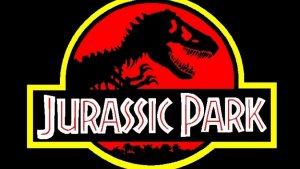
If you grew up in the 90s, you were probably fascinated with dinosaurs. “Dinomania” was a fad that broke records among the young people of that decade and was propitiated by the premiere of the Jurassic Park movie saga.
The first of the films, directed by Steven Spielberg, premiered in 1993 and was based on the novel of the same name by Michael Crichton. It’s one of the most expensive movies made to date. It became really popular, even becoming the highest-grossing film to date until 1997, when the movie Titanic premiered.
What’s the true key to its success? In addition to its fantastic marketing campaign, Jurassic Park premiered at a truly auspicious time. The special effects in the 70s and 80s, however amazing, were rudimentary. Still, the new technologies, which began to flourish in the pre-Internet era, allowed Jurassic Park to present never-before-seen effects.
Dinomania
Most children are fascinated by dinosaurs. This movie made them seem so real that it engraved them in people’s memory forever. Who didn’t know what a Velociraptor, a Triceratops, and a Tyrannosaurus rex were? Not only that, but one could distinguish between carnivores and herbivores.
The fascination and success that this fascinating movie generated led to sequels. Other dinosaur films focused on a younger audience. For example, The Land Before Time, which was also produced by Spielberg.
The 90s were all about dinosaurs. Many grew up with them and, shortly after, at the turn of the century, the fad seemed to be over. Then, in 2015, a fourth installment of the franchise, Jurassic World, premiered. It wasn’t a hit like the first movie, but it definitely awoke curiosity. And so, dinosaurs once again filled the movie theaters.
Recently, the second installment premiered. The curious thing is that, from an adult perspective, one comes to the realization that the Jurassic Park saga hides a lot more than roars and science fiction.
Jurassic Park: Ethical Issues
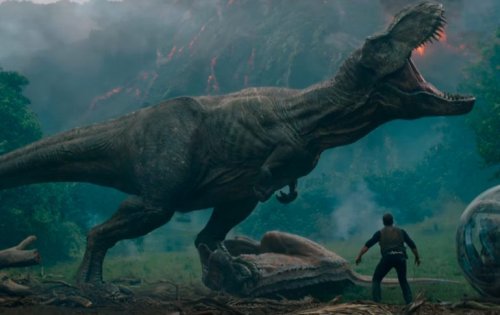
Another key to the success of Jurassic Park is, without a doubt, the scientific advancements of the 90s. The cloning of Dolly, the sheep meant possible genetic advances that, until then, seemed impossible.
The idea that a fossilized mosquito could be used to extract dinosaur blood and, hence, cloned, was credible and fascinating at the time.
Back then, very few people knew that dinosaurs had feathers, that the fearsome Tyrannosaurus rex didn’t roar and that it instead emitted a sound that sounded more like a bird’s (its closest relative). For sure, many scientists collaborated to create a prehistoric animal image that was as authentic as possible.
The Plot
This first film presents a multimillionaire who decides to build a part in Isla Nublar (a fictional place). His team of scientists “resurrected” prehistoric creatures by combining DNA found in mosquito fossils with the DNA of living frogs in order to “fill in the missing gaps“.
At that point, the businessman hires paleontologist Alan Grant and paleobotanist Ellie Sattler as part of an evaluation committee.
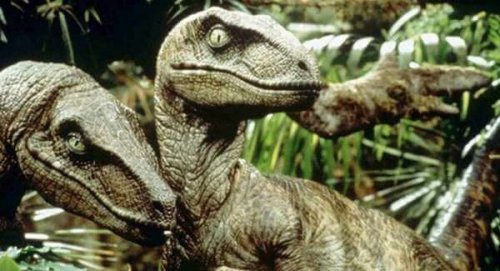
Both experts are fascinated by the cloned creatures. However, from the beginning, the film hints that the scientists question some of the decisions made, as well as the ethics behind the actual park.
For example, the clones are female in order to avoid reproduction and to control the dinosaur population. However, the frog DNA comes from a species with sequentially hermaphrodite traits. Thus, the dinosaurs could ensure their survival by switching to the other gender.
Thus, the dinosaurs in the film manage to reproduce in the same way as the aforementioned frogs, demonstrating that life always finds a path. That all species fight to survive and adapt to changing environments.
Moral Dilemma
By doing this, the film analyzes the eternal moral dilemma of science: the ethics of “playing God”. It leads the viewers to question if humans should decide the fate of the rest of the species.
Throughout history, it’s clear that many species became extinct due to human intervention and irresponsible behavior. Dinosaurs, on the other hand, became extinct naturally. So why bring them back? Does it actually make sense to revive an already extinct species?
Despite its fantastic story, Jurassic Park is very close to reality. It proposes an ethical discourse in regard to current human actions.
Humans truly believe they’re masters of the rest of the species and should, therefore, decide their fate.
Jurassic Park = $$$
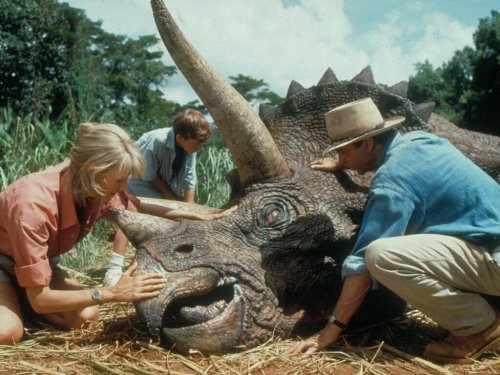
“The key to a happy life is to accept that you’re never actually in control.”
-Jurassic Park-
The last installments of the saga once again aroused human curiosity. In Jurassic World (2015) dinosaurs are still living on Isla Nublar. But the island is now a theme park with cutting-edge technology.
This new park displays its animals as most zoos do to satisfy human curiosity and profit from it.
However, any theme park that wishes to continue attracting patrons must innovate. It must create new attractions and keep people entertained. So how about a mutant dinosaur? The most fearsome specimen ever seen. A species created by and for humans: the one and only, Indominus rex. (A rather attractive name for old and new visitors who would like to spend a weekend full of adventures on Isla Nublar).
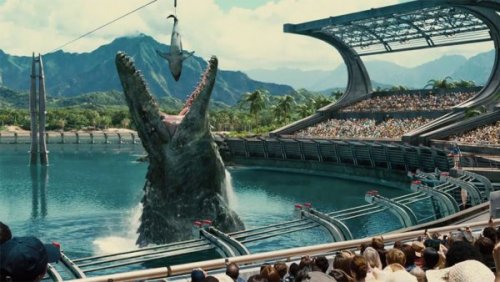
As in the previous films, this business makes many forget that the creatures who inhabit the park are actually living beings that don’t belong in display cages. But, of course, these unethical actions will have, as in the previous films, catastrophic consequences that will force people to rethink the limitations of science.
Fallen Kingdom
In the last installment, Jurassic World: Fallen Kingdom (2018), the argument takes a different direction. Isla Nublar is abandoned, but the dinosaurs are still there. An erupting volcano threatens the existence of these species. Thus, two currents merge.
On one hand, the one that believes that nature itself is correcting the mistake humans made in cloning the creatures. On the other hand, the one that believes that, because these animals are alive, humans should prevent their extinction.
This is a moral debate that brings animal life in captivity to mind, the abuse humans perpetrate on every other non-human species. Human selfishness and our idea of superiority over the rest of the species.
Are we truly aware of the impact we have, both on the environment and on the fate of the rest of the species?
From its fantasy world, Jurassic Park questions many acceptable actions and invites viewers to consider that, if they want a better planet, then they should reflect on how they treat the rest of the species that inhabit it.
This text is provided for informational purposes only and does not replace consultation with a professional. If in doubt, consult your specialist.








